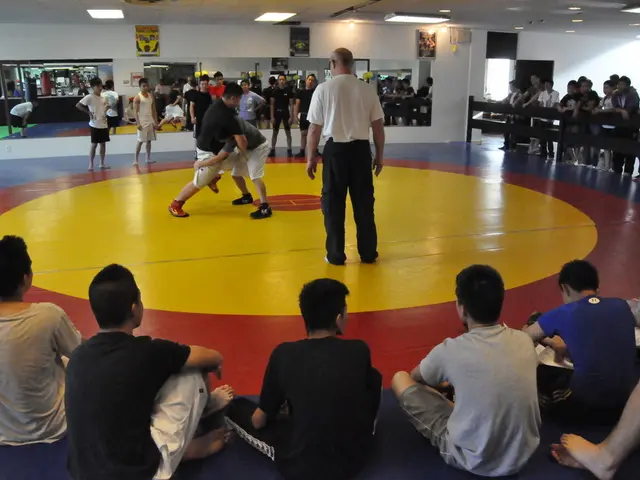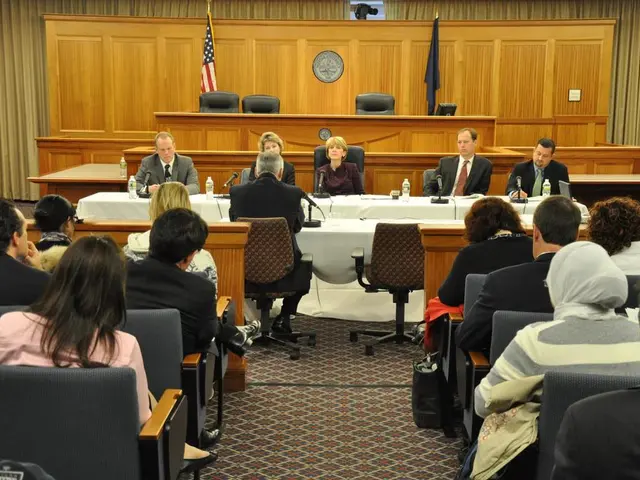Young professionals are increasingly using their online presence, or digital footprints, as stand-ins for traditional resumes in the job-hunting process.
In the modern job market, the use of social media has become an integral part of the hiring process, offering unique advantages and challenges.
## Unveiling Hidden Talents
One significant advantage of social media in recruitment is its ability to engage with a diverse and broader pool of candidates. Employers can potentially discover hidden talents that might have gone unnoticed in traditional job-seeking scenarios [1][3].
## Reflecting Company Culture
Companies can showcase their culture and values on social media, attracting candidates who align with these aspects. This can lead to a better candidate-employer fit [4].
## Reaching the Younger Generations
Younger candidates, who are more likely to be active on social media, are more easily reached through platforms like Instagram and Twitter, making them effective channels for recruitment efforts [3].
## The Quest for Fairness
Despite these advantages, the use of social media in hiring presents challenges in maintaining fairness and equity. Bias can creep in as hiring teams may make assumptions based on publicly available information [2]. Additionally, the reliance on technology can exacerbate existing inequalities, as not all candidates have equal access to the same digital tools and platforms.
## Achieving a Fair Balance
To mitigate these issues, employers can implement AI tools to automate candidate sourcing and reduce human bias, ensuring that the algorithms themselves are unbiased [1]. Using a mix of platforms can help reach different demographics and avoid relying on a single platform, which can limit diversity. Establishing clear criteria for evaluating candidates that focus on skills and experience rather than personal profiles or biases can also help [2].
Moreover, ensuring that the employer brand is authentic and reflects the company's genuine values and culture can help attract candidates who are a good fit without relying on superficial judgments [4].
By adopting these strategies, employers can leverage social media effectively while maintaining fairness and equity in the hiring process.
However, the permanence of digital footprints is a concern. Posts from years ago can be retrieved and judged without context or nuance, which could potentially lead to unfair assessments [5].
As the use of social media in hiring continues to grow, it is crucial for employers to approach this practice with caution and a commitment to fairness. Educational institutions also play a vital role in integrating digital literacy into career development to support the young generation in navigating this digital landscape [6].
Candidates should be informed before their digital behaviours are evaluated and given an opportunity to explain or contextualize past posts. Transparency and open communication are key to maintaining fairness in the hiring process [7].
In conclusion, while social media offers a wealth of opportunities for employers to gain insights into candidates' professional and personal profiles, it is essential to approach this practice with a commitment to fairness, digital literacy, and compassion. Whether social media is a candidate's career maker or killer will depend on these factors.
References: [1] https://www.forbes.com/sites/forbesagencycouncil/2021/04/07/heres-how-to-use-ai-to-maximize-your-recruitment-efforts/?sh=73a42182565c [2] https://www.shrm.org/resourcesandtools/hr-topics/talent-acquisition/pages/social-media-screening-bias.aspx [3] https://www.theladders.com/career-advice/job-search/how-to-use-social-media-to-find-a-job [4] https://www.glassdoor.com/employers/blog/the-importance-of-employer-branding-on-social-media-for-recruitment/ [5] https://www.forbes.com/sites/forbesagencycouncil/2021/04/07/heres-how-to-use-ai-to-maximize-your-recruitment-efforts/?sh=73a42182565c [6] https://www.educationdive.com/news/how-colleges-are-addressing-digital-citizenship-in-the-classroom/604254/ [7] https://www.shrm.org/resourcesandtools/hr-topics/talent-acquisition/pages/social-media-screening-candidate-consent.aspx
- Social media, being a part of the hiring process, can aid in discovering hidden talents that may have been overlooked in traditional job-seeking methods.
- Employers can demonstrate their company culture and values on social media, appealing to candidates who share similar perspectives.
- Social media platforms such as Instagram and Twitter are effective ways to reach younger candidates who are more likely to be active online.
- Maintaining fairness and equity is a challenge when using social media for hiring due to potential biases based on publicly available information.
- Relying excessively on technology can exacerbate existing inequalities, as some candidates may lack equal access to digital tools and platforms.
- To promote fairness, employers can employ AI tools to automate candidate sourcing, establish clear evaluation criteria, and develop an authentic employer brand that reflects true values and culture.
- By adopting these strategies, employers can effectively utilize social media while ensuring fairness, digital literacy, and compassion, thus shaping a candidate's career for the better or worse.








